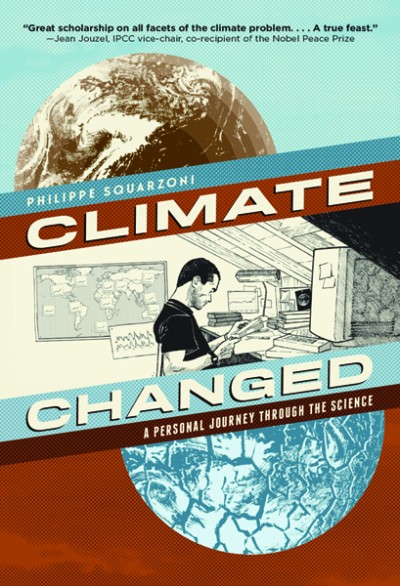 I love graphic novels. That being said, I read a lot of graphic novels that end up being disappointing. The format has a lot of potential for transformative storytelling (see Scott McCloud’s “Understanding Comics” for more on that topic), but often depth of exposition is sacrificed in favor of clear imagery and ease of reading. And it makes sense – creating a page of comics can take a lot longer than a page of prose, unless the art style is particularly sparse or sloppy. When the topic is a scientific one, as with other public-aimed science writing, it is tempting for authors to simplify a topic beyond the truth. Philippe Squarzoni’s 2014 effort yields to neither temptation.
I love graphic novels. That being said, I read a lot of graphic novels that end up being disappointing. The format has a lot of potential for transformative storytelling (see Scott McCloud’s “Understanding Comics” for more on that topic), but often depth of exposition is sacrificed in favor of clear imagery and ease of reading. And it makes sense – creating a page of comics can take a lot longer than a page of prose, unless the art style is particularly sparse or sloppy. When the topic is a scientific one, as with other public-aimed science writing, it is tempting for authors to simplify a topic beyond the truth. Philippe Squarzoni’s 2014 effort yields to neither temptation.
The book consists of over 450 pages of beautiful, sparse black-and-white artwork in a documentary style. Serene nature imagery paired with the author’s internal conflict about how to personally respond to the growing climate imagery sets the scene. Interviews often are a series of talking heads, like watching an interview in a television documentary, and expositions of scientific or economic considerations are paired to great effect with classic advertisements (rendered in pen and ink). For example, after a discussion of the consequences of rampant consumerism, we see an 80’s Isuzu ad paired with the text:

“Climate change is also a symptom of a breakdown of solidarity, a sign of collective selfishness. Ironic hedonists, trained by free downloads. Reckless and thoughtless consumerism. The rise in global warming reflects the rise of our desires, and of our indifference to the threat the world is facing. The rise of insignificance. And because we are innocent and heartless, because we think the climate crisis is only out there someplace else, but because it is inside us, we don’t notice a thing.”
The book is long, and, like the scientific consensus on global warming, the story is a depressing one. It is hard to see a way that our society can so fundamentally change from our profit-driven and ecologically careless approach. Because of the length of the book, and perhaps because it can sometimes be a bit repetitive, it does take some effort to finish the book. But the effort is worth it.
You can see a sampler of the contents of the book on Issuu, courtesy the publisher.
This is a cross-post from Daniel’s website, http://www.danielmwatkins.com. All opinions here are his alone.
